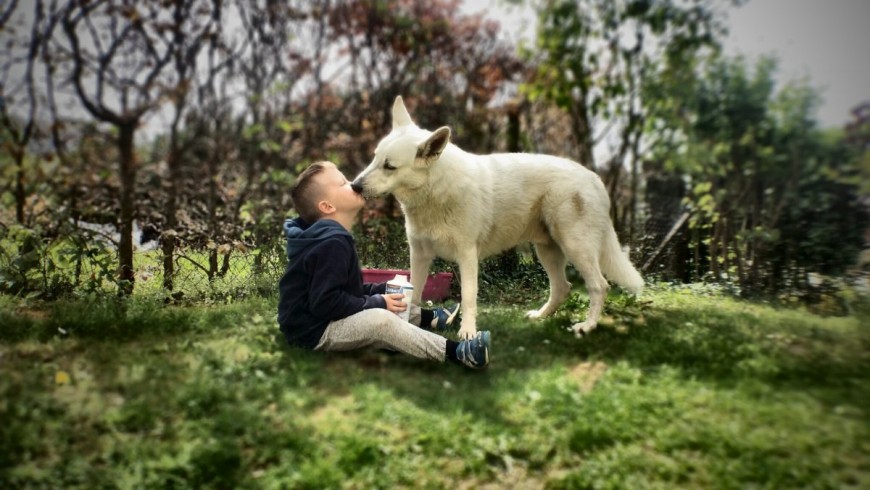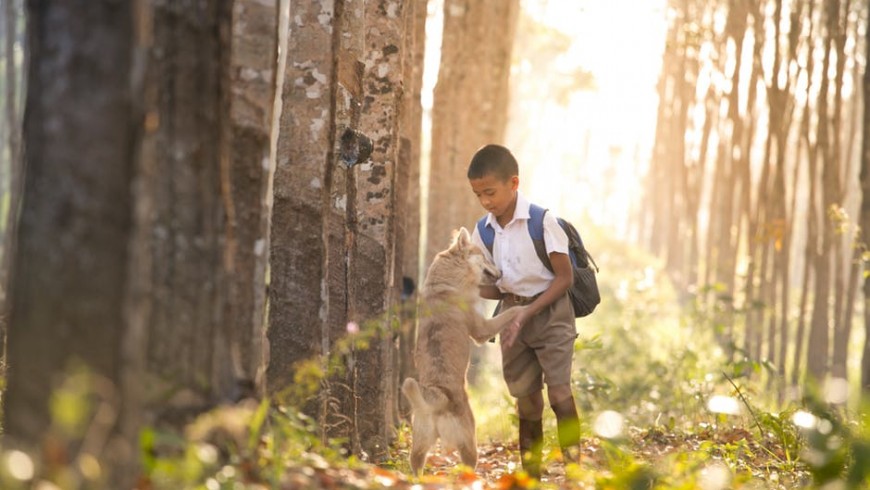Dogs improve our sleep, defend babies from asthma and eczema, make children more sensitive and responsible. Here are the beneficial effects of our four-legged friends according to the latest scientific research.
Here are three news that will make animal lovers happy. To improve our sleep and protect children from allergies do not need to move to the mountains, just take a dog. Some recent scientific studies say that our four-legged friends improve our well-being. In addition, animals help our children grow as more sensitive and responsible people.
Sleeping with the dog improves the quality of sleep

Those who sleep with their dog will have been told that they should not do it. This new research says exactly the opposite. The news was published in the scientific journal Mayo Clinic Proceedings. The research says in this case that adults who sleep with their dog have a better quality of sleep than people of the same age and the same health conditions.
For 5 months, the experts examined a group of adult dog owners, of whom only a few shared the bedroom with their four-legged friends. Through devices able to track the sleep patterns of people and animals, research has shown that those who are used to sharing the bedroom with their dog have a better quality of sleep than those who do not.
The US experts have stressed that sleeping with your dog in the same room can significantly improve the quality of sleep. But be careful not to make room for the dog in your bed, because if you wake up often can create noise instead.
The dog, a remedy against eczema and asthma

If you wait for a baby, your four-legged friend will ensure that the baby will be protected from the risk of allergic eczema and will remain immune for about 10 years. This is demonstrated by the study “Asthma and Immunology” presented at the annual congress of the American College of Allergy, which was held in Boston (United States), from 26 to 30 October 2017.
The scientists presented two separate studies: one on the role of dogs in the prevention of eczema in children and the other in the prevention of asthma.
In the first, the researchers found that the proximity between the mother and a pet before the birth of the child is significantly associated with a lower risk of eczema in the childhood of the unborn child. This beneficial effect decreases after 10 years.
The second study was conducted on children and asthmatics who are allergic to dogs. Scholars have found that the bacterial flora of dogs has a protective effect against allergic symptoms. Although, in urban areas, the presence of a dog often accentuates these same symptoms.
Thanks to dogs, children become more sensitive and responsible

“Marco, for your birthday you will receive a Labrador puppy as gift!” Marco is so happy that he jumps for the joy . It seems a trivial matter, but the arrival of the new four-legged friend will help Marco in the growth process more than it is imagined.
Before the new guest arrives, Marco has to go to the animal shop to buy everything it needs: doghouse, leash, toys and so on. Deciding what to buy helps the child to understand the needs of the puppy.
Children who grow up with animals understand better the needs of the others and develop empathy.
At the puppy’s arrival, Marco has the duty to feed it three times a day. Taking care of his little friend helps the child to get prematurely the responsibilities towards the others. Being a good owner means that Marco has to pick the potty of his puppy up. This helps Mark to learn what the civic sense is and so respecting it.
Now that Marco is an adult, he knows what taking care of the others means. His friend, who made him so angry if it did not obey him, taught him what having patience and respecting others people means.
If you have a dog at home, your child will become a more sensitive and responsible person, the researchers say.
Thanks to the daily proximity to the animal for the child it will be easier to develop these qualities:
- Respect: initially children are tempted to consider animals as toys, but they soon realize that they are living beings and have feelings, which children learn to respect.
- Empathy: children learn to put themselves in the shoes of others by doing this exercise with their dog.
- Loyalty: with its character the dog transmits the importance of fidelity to the child and to stay together forever. A teaching that will remain imprinted on your son unconsciously.
- Sensitivity: growing with a dog will stimulate the child’s love for animals and a special sensitivity towards injustices and other people’s problems.
- Sharing: with the four-legged friend the child must share spaces, games, attention or even the bed. In this way he understands the importance of sharing with others.
- “Growing in the company of an animal will help children become more sensitive adults, as they will develop their emotional intelligence to the full” (Silvia Naya, child psychologist)
What do you think? Is your four-legged friend a life coach of your childs?
